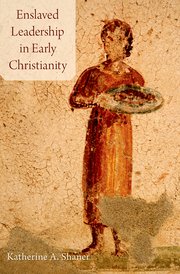Katherine Shaner: Enslaved Leadership in Early Christianity
 Katherine Shaner, Enslaved Leadership in Early Christianity (New York: Oxford University Press, 2018) xxix + 207 pages, ISBN 9780190275068.
Katherine Shaner, Enslaved Leadership in Early Christianity (New York: Oxford University Press, 2018) xxix + 207 pages, ISBN 9780190275068.
Dr. Katherine Shaner, in a revised form of her Harvard Divinity School dissertation, asks a provocative question. What role, if any, did enslaved persons embody in the congregation of the early church? Shaner’s response to this enticing question offers readers not only a cogent account of the life of enslaved people in early antiquity, but also an incisive lesson for how one ought to conduct historical investigations altogether. For the lay person or pastor, Shaner provides a new vantage point through which to understand the complex roles of figures like Onesimus or the roles of women and enslaved persons in the Pastoral Epistles. One also gleans invaluable tools for exploring ancient history beyond well-trodden literary avenues, which can exaggerate details or worse, deliberately neglect traces of lower-class populations, through archaeological and material avenues as well. The upshot is a commendable lesson in “ambiguity” (the term appears 30 times in the 109-page manuscript body): laying aside one’s assumptions about what a biblical passage should say to discover what the biblical text does (and, in some cases, does not) say.
One constant theme of Shaner’s project is her via media approach to slavery in the ancient world vis-à-vis Christianity. In chapter three, for instance, Shaner turns to the apostle Paul to discuss his endlessly debated position on slavery. Shaner presents a refreshingly nuanced situation in which Paul, as a creature of his time, is caught up in analogous debates present within his Jewish and Greco-Roman setting. In this scheme, Paul neither fully “advocated systemic abolition, since his social milieu accepted slavery” (p. 47) nor did he fully reinforce slave/free dynamics. Instead of giving into the urge to lump Paul into one camp or the other, Shaner presses her readers “to keep in tension the exclusionary logic of slavery and the multiple subject positions that enslaved persons held in early Christian communities” (p. 61). In another example, Shaner considers the artifact of the Southern Market Gate on the Triodos in Ephesos. On the one hand, a stone pillar adjacent to the Market Gate contains an inscription of the Persicus decree—a decree that functioned to subordinate public slaves’ participation in the Artemis cult. The net result is a public attempt to ensure “only the right sort of people will hold leadership positions in the cult” (p. 23). On the other hand, at this same location, we have evidence of the “two freedpersons, Mithridates and Mazaeus, [who] built and dedicated the gate to Livia and Augustus, their former owners” (p. 29). In this remarkable example, overlording imperial tactics coexist with a case of civic benefaction by two formerly enslaved persons in the public marketplace. In this way, the politics of reading require the historian to consider not simply what a text states but what a text does. Just as the Persicus decree aims to silence and subjugate, the adjacent dedication by Mithridates and Mazaeus testify to freedom and participation. In Paul’s case, the history of interpretation tends to focus on what Paul states rather than on the more hidden or performative dimensions of his letters. Destabilizing this “Paul-centered framework” (p. 59) draws attention to the polyvalent features of Onesimus, for example, who is described as a “minister” (diakonē) with Paul (Phlm 13)—a terminus technicus for cultic workers in Ephesos as well as early Christian groups (p. 59). Shaner’s project exposes how the same ambiguous tensions within the biblical text are operative in the surrounding Roman cultural.
What role did enslaved persons embody in the congregation of the early church?
There is a lesson here about laying aside one’s assumptions about what we think a biblical passage should say to instead discover what the biblical text really does or does not say.
Review by JP O’Connor
Publisher’s page: https://global.oup.com/academic/product/enslaved-leadership-in-early-christianity-9780190275068
Category: In Depth, Summer 2022


